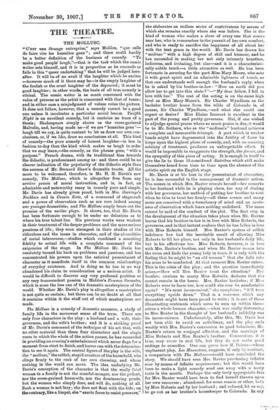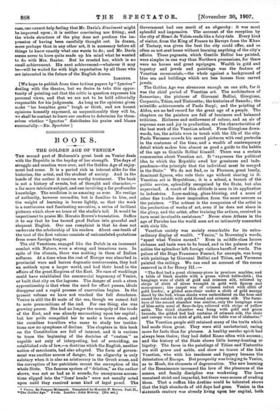THE THEATRE.
THE MOLLUSC.
" C'EsT nne etrange entreprise," says Moliere, " quo cello de faire rire les honnetes gens " ; and there could hardly be a better definition of the business of comedy. " To make good people laugh,"—that is the task which the comic writer sets himself, and it is in proportion as he succeeds or fails in this "queer undertaking" that he will be judged here- after. It will be of no avail if the laughter which he excites —however much of it there may be—is the empty laughter of the foolish or the cruel laughter of the depraved; it must be good laughter; in other words, the basis of all true comedy is ethical. The comic writer is as much concerned with the value of persons as the artist is concerned with that of tones; and in either case a misjudgment of values rains the picture. It does not follow, however, that a comedy cannot be a good one unless it inculcates a particular moral lesson. Twelfth .Night is an excellent comedy, but it contains no trace of a thesis ; Shakespeare simply shows us the cross-gartered Malvolio, and, having made us—if we are " honnetes gene "- laugh till we cry, is quite content to let us draw our own con- clusions, or, if we like, draw no conclusions at all. This kind of comedy—the pure comedy of honest laughter—is less in fashion to-day than the kind which makes us laugh in order that we may learn,—the comedy, as the phrase goes, "with a purpose." French drama, with its traditional bias towards the didactic, is predominant among us : and there could be no clearer indication of the popularity of the didactic style than the success of Mr. Bernard Shaw's dramatic tracts. All the more to be welcomed, therefore, is Mr. H. H. Davis's new comedy, The Mollusc, which is altogether free from any arrAre pensie of moral instruction, and is, in fact, an admirable and noteworthy essay in comedy pure and simple. Mr. Davis has already given proof, both in Mrs. Gorringe's Necklace and in Cousin Kate, of a command of stagecraft and a power of observation such as are rare indeed among our younger dramatists; and The Mollusc amply bears out the promise of the earlier plays. It shows, too, that Mr. Davis has been fortunate enough to be under no delusions as to where his true talent lies. His previous works were weakest in their treatment of the deeper problems and the more serious passions of life ; they were strongest in their studies of the ridiculous and the inane in character, and of the absurdities of social intercourse,—studies which combined a searching fidelity to actual life with a complete command of the exigencies of the stage. In The Mollusc Mr. Davis has resolutely turned his back on problems and passions, and has concentrated his powers upon the satirical presentment of character as it manifests itself in the common relationships of everyday existence. And in doing so he has in no way abandoned his claim to consideration as a serious artist. It would be difficult to discover any very profound problem or any very transcendent passion in Moliere's Femmes Savantes, which is none the leas one of the dramatic masterpieces of the world. Whether Mr. Davis's play is altogether a masterpiece is not quite so certain; but there can be no doubt at all that it contains within it the stuff out of which masterpieces are made.
The Mollusc is a comedy of domestic manners, a. study of family life in the narrowest sense of the term. There are only four characters in the play: a husband and a wife, their governess, and the wife's brother; and it is a striking proof of Mr. Davia's command of the technique of his art that, with no other material than these four characters and the single room in which the whole of the action passes, he has succeeded in providing an evening's entertainment which never flags for a moment from start to finish, and leaves one with the determina- tion to see it again. The central figure of the play is the wife, the "mollusc," the selfish, stupid creature of the household, who clings firmly to the rock of her own choosing, and whom nothing in the world can move. The idea underlying Mr. Davis's conception of the character is that the really fatal woman in a family is not the scandal-monger, nor the pedant, nor the cross-grained housewife, nor the domineering prude, but the woman who simply does, and will do, nothing at all. Such a woman is not lazy; she does not float with the tide; on the contrary, like a limpet, she "exerts force to resist pressure,"
she elaborates an endless series of contrivances by means of which she remains exactly where she was before. She is the kind of woman who makes a slave of every one that comes near her, who is remorseless in the pursuit of her own comfort, and who is ready to sacrifice the happiness of all about her with the best grace in the world. Mr. Davis has drawn his " mollusc " with a high degree of skill and humour, and he has succeeded in making her not only intensely heartless, ludicrous, and irritating, but also—and it is a characteristi- cally subtle touch—a little attractive as well. He has been fortunate in securing for the part Miss Mary Moore, who acts it with great spirit and an admirable lightness of touch, so that one understands well enough the husband's reply, when he is asked by his brother-in-law : "How on earth did you allow her to get into this state P "—" My dear fellow, I fell in love with her." The rest of the acting is on the same high level as Miss Mary Moore's. Sir Charles Wyndham as the bachelor brother home from the wilds of Colorado is, of course, Sir Charles Wyndham,—and what else could one expect or desire P Miss Elaine Inescort is excellent in the part of the young and pretty governess. But, if one wished to adjudge special praise where so much praise is due, it would be to Mr. Sothern, who as the "mollusc's" husband achieves a complete and memorable triumph. A part which in weaker hands might have degenerated into the futility of farce he keeps upon the highest plane of comedy, and, with an amazing sobriety of treatment, produces an unforgettable effect. It would be impossible to exaggerate the strength, the finesse, and the sympathy of this piece of acting. It is enough in itself to give the lie to those ill-considered diatribes which still make themselves heard from time to time upon the absence of the artistic spirit on the English stage.
Mr. Davis is at his best in the presentment of character; he is less successful in the management of dramatic action. The scenes in which Mrs. Baxter reveals herself—her remarks to her husband while he is playing chess, her way of dealing with her governess, her method of putting her brother to rout when he tries to treat her firmly—all these scenes and many more are conceived with a trenchancy of mind and an acute- ness of observation which leave nothing undefined. The same cannot be said of the conduct of the plot. The first step in the development of the situation takes place when Mr. Baxter learns that his brother-in-law is in love with Miss Roberts, the governess, and in that instant realises that he has fallen in love with Miss Roberts himself. Mrs. Baxter's system of selfish indolence has had the inevitable result of allowing Miss Roberts to fill her place, not only in her husband's daily life, but in his affections too. Miss Roberts, however, is in love with Mrs. Baxter's brother, and when Mr. Baxter comes into the room and finds the young lady in tears, it is only with the feeling that be might be "an old woman" that she falls into his arms to be comforted. At that moment Mrs. Baxter enters. This is the crisis of the play; and the question immediately arises,—How will Mrs. Baxter treat the situation ? Her brother, anxious to marry Miss Roberts, declares that she cannot remain in the house. Mrs. Baxter hesitates ; if Miss Roberts were to leave her, how could she ever be comfortable again? "It's most inconvenient," she complains ; "it'll turn everything upside down." That is a sentence which any dramatist might have been proud to write ; it is one of those illuminating sentences which seem to sum np within them- selves a whole human character,—what was really distressing to Mrs. Baxter in the thought of her husband's infidelity was its inconvenience. Unfortunately, after this, Mr. Davis has not been able to avoid an anticlimax, and the play ends weakly with Mrs. Baxter's conversion to good behaviour, Mr. Baxter's return to conjugal affection, and the marriage of Miss Roberts and Mrs. Baxter's brother. Conversions, it is true, may occur in real life, but they do not make good endings to comedies. One can guess how M. Brieux—whose unpleasant play, Les Hannetons, suggests, if only by contrast, a comparison with The Mollusc—would have concluded the story. We should have seen Mrs. Baxter purchasing infinite ease by means of infinite acquiescence; but this would have been to make a light comedy send one away with a nasty taste in the mouth. Perhaps the only truly appropriate fate for Mrs. Baxter would have been to find herself thrown upon her own resources ; abandoned, for some reason or other, both by Miss Roberts and by her husband ; and reduced, let us say, to go out as her brother's housekeeper to Colorado. In any
ease, one cannot help feeling that Mr. Davis's denoUment might be improved upon ; it is neither convincing nor fitting; and the whole structure of the play does not produce the im- pression of having been carefully thought out. In drama, more perhaps than in any other art, it is necessary before all things to know exactly what one wants to do; and Mr. Davis seems never to have quite made up his mind what he wanted to do with Mrs. Baxter. But be created her, which is no small achievement. His next achievement—whatever it may be—will be waited for with high expectation by all those who are interested in the future of the English drama.
IGNOTUS.
[We hope to publish from time to time papers by "Ignotus " dealing with the theatre, but we desire to take this oppor- tunity of pointing out that the critic in question expresses his personal views, and that we are not to be held editorially responsible for his judgments. As long as the opinions given make " les honnete-s gene" laugh or think, and are honest opinions honestly expressed, as unquestionably they will be, we shall be content to leave our readers to determine for them- selves whether " Ignotus " distributes his praise and blame saccessf ully.—En. Spectator.'



















































 Previous page
Previous page